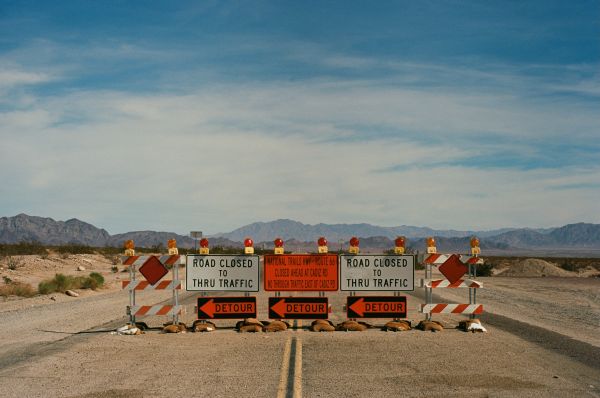
Last weekend I was driving a friend home down Portage Avenue and we encountered an unexpected traffic jam. Four lanes had been reduced to one because a crew was working on the overpass.
Even though it was Saturday afternoon and neither of us were in any sort of rush, and even though I was consciously trying to take the delay in stride, I couldn’t help but comment that they’ve been working on that bridge “for 8,000 years now” and that contractors seem to take as long as possible to finish things.
Having worked in the construction industry, I know this isn’t true. Contactors get paid for the completion of the job, not the time spent on it, and the city does everything they can to minimize traffic disruption, which is why this was happening on Saturday and not Monday.
Still, something in me wants there to be a guilty party. If there’s nobody to blame, I have to recognize that I live in an unsympathetic reality in which bridges have to be fixed, other cars use the road, and pain and inconvenience cannot always be argued with. My intuitive preference is to believe that even the smallest difficulties in my life are unnecessary and the fault of bad actors.
This is a very human impulse, I think — to assign culprits to things that go wrong. When the economy is sluggish, it’s always due to bad policies and the bad people who make them, rather than hideously complex market interactions that even economists don’t understand. When the local football team has a disappointing season, it’s the failure of the coach, or the quarterback, or the management, or a lack of fan support, rather than all those things at once and none in particular — or simply because of the mathematical reality that a team has to lose every time another team wins.
If you watch man-on-the-street interviews about world issues, you might notice an interesting contradiction: people often struggle to define the problem with much clarity, but they can always tell you exactly who’s at fault. Hillary Clinton. White supremacists. The mainstream media. Joe Rogan. Behind every bad thing is a bad person that needs to be stopped.
I’m not arguing that there are no bad actors, only that the human mind is quick to attribute anything it doesn’t like to some foul group of people and their faulty morals. For example, nobody thinks poverty is a good thing. If you ask people why poverty exists, you’ll usually get a quick answer attributing it to bad people. The government isn’t doing enough to combat it. Greedy speculators inflate housing prices. Some people don’t take responsibility for their own lives. People would rather buy a Frappuccino than give to the needy. Capitalist oppressors set up the system to serve themselves only. Reagan and Thatcher killed the middle class.
Unless you’re strongly identified with a particular political camp, you might recognize some or all of these claims make some sense, which suggests that the problem is a collision of many complex factors and interests, rather than the work of a sole guilty party and its inarguable badness.
The least articulate form of the bad actor explanation might be the one we hear most often: that human beings are terrible and society is terrible. As much as that might explain any problem you can think of, it’s a ridiculous conclusion to make, if you consider that our species is obsessed with right and wrong and discerning one from the other.
Three Reasons Everything is Someone’s Fault
So why is it so tempting to attribute everything bad to bad actors? I’m not sure it has much to do with solving the problem, or discovering the truth behind it. My guess is that it helps us process our painful emotions about the problem, in at least three ways:
First, if you can convince yourself that a given problem is caused by bad people, then it means someone else is responsible for it. You may have a stake in it, and want to say something about it, but you aren’t a causal factor (such as the traffic in the traffic jam, or the resident driving up housing prices).
Second, it allows us to believe bad things shouldn’t happen, at least not to ourselves. The thought, “this shouldn’t be happening” implies that something outside of natural processes caused the problem, which leaves little explanation but that someone is doing something they shouldn’t be doing. If there’s a bad actor behind it, you don’t have to consider certain dark existential possibilities: that life is made of tradeoffs, suffering is unavoidable, problems are rarely simple and self-contained, and there is no “right” path we should all be on.
Third, it makes solutions seem relatively straightforward: stop the bad people, or get rid of them.
As far as I can tell, interpreting problems as the crimes of clear perpetrators is the only way we attempt to justify real hatred for people. We need that sense of simplicity – the bad thing comes from the bad people — to hate a person or group without reservation, and history is full of examples.
Again, it’s not that there’s no such thing as fault, or that solutions never require holding a particular party to account. Only that there’s something about the human mind that wants a given problem to be someone’s fault, simply because it would be easier if it were.
Watching the mind make bad guys
Monitoring this tendency in yourself can be revealing – to witness how the mind generates suspects and verdicts within seconds, and how emotionally-driven the process is. It becomes clearer that villainizing is mostly a coping mechanism, rather than a sensible way of understanding or addressing problems.
In my experience, a little curiosity on this front makes political topics less maddening to think and talk about. Mostly though, I notice myself craving clear perpetrators for the kind of tiny, personal offenses that happen a hundred times a day.
The other day I tried to observe my indignation towards others during a regular trip to the gym, and identified so many villains in such a short time that I stopped counting. I’ll describe only my first encounter.
As soon as I arrived, I waited behind a lady asking the clerk a spectacularly long-winded question about memberships, while I just wanted to scan my card and go in. First I felt mild ill will towards the lady – obviously, questions must be asked, but why take so long to ask them? Once I noticed I was making a perpetrator of her (rather than trying to solve my problem) it seemed a bit silly to condemn her on the basis of her question’s word count, so my scrutiny slipped over the clerk. She should know how to handle this exact situation! It must come up all the time.
Upon examination, this objection also felt like a weak one – it’s understandably difficult to have two customers who both need you at the same time, especially when one of them is as impatient as I apparently am.
Just as I was considering who else’s fault this could be – whoever schedules staff lunch breaks, maybe — the lady turned and said, “Oh, please go ahead!” with a genuine smile, and I assured her it was no problem at all.
And I meant it, because suddenly there was nothing I needed a villain for.
***
Photos by A. Taktarov, S. Blake, M. Vitolic, J. Dylag, P. Du Preez, and R. Sarsfield





 I'm David, and Raptitude is a blog about getting better at being human -- things we can do to improve our lives today.
I'm David, and Raptitude is a blog about getting better at being human -- things we can do to improve our lives today.
Interesting insight, David, as always. For me, the most revealing incident was the one described in the last two paragraphs. As soon as the formerly bothersome woman talking to the clerk let you go ahead of her, all the tension and blaming evaporated. A great lesson on the power of letting go, on the part of the woman ahead of you, and how a simple change on her part invoked a genuine change of heart in you. Amazing how such a little thing like that can have such a big effect, ain’t it?
Yes exactly. The whole story about me being wronged by a bad person, instead of just inconvenienced by circumstances, disappeared the moment the circumstances changed. Suddenly the sins committed by those other people ceased to exist, because they were all fabrications my mind was using to contend with adversity.
My theory is that we are predisposed by our evolutionary history to detect threats, *especially* by unpredictable ‘living’ agents. So we react immediately to a long sinuous shape in the grass… and only later realise it was a hose or a dead snake.
This awareness spills over into the possible intentional actions of the people around us. We are a social species tuned to personal ‘status’ after all. And perhaps we are more aware than needed in day to day life because the edge cases may otherwise ‘get you’. Assigning non-specific agency to events which may therefore be ‘understood’ allows us to relax our hyper awareness. We’ve assessed the threat as not an immediate problem we have to address, or take blame for.
If our agency awareness predispositions have an evolutionary basis then you would expect the levels of awareness to vary between individuals. We know that some people are paranoid and conspiracy theorists, and some people are chill and laid back. Most of us are somewhere between these two extremes.
I think you’re right on the money here. I am a big fan of Jonathan Haidt’s book The Righteous Mind, which spells out how evolutionary psychology relates to our moral beliefs. It is fascinating and explains a LOT about how easily and reflexively we make moral judgments of each other and other groups.
Thank you for yet another well written piece. I just want to also commend you for your choice of illustrations and image text. It brings another layer of depth and fun to your posts, David. I can tell you spend time and care with the pictures and it’s very much appreciated
Thanks. When a piece gets longish I put in images and silly captions, both to make it more readable and also to lighten the tone. It’s worth the time I think.
This has been a conundrum that’s come up frequently to me. Thanks for sharing your story!
I regularly watch the news. Your article reminded me of why I shouldn’t. It’s designed to get hysterical about the weather, the Democrats, the Republicans, Ukraine, pileups on the interstates, whatever.
I can’t control others. I can control myself. I might just take a week off of watching the news and see if I’m less upset at the state of things. The world will carry on without me, I’m sure.
The news is kind of a conundrum. Journalism serves and important purpose, and it’s one of the only ways to gather highly timely information about world events, but that information is filtered through business models that benefit from sensationalism and oversimplification. I suppose one answer is to use it sparingly and stay aware of the dangers.
Taking time off is very enlightening if you’ve never done it. It helps reveal that the state of the world is not the same as the state of the news, but are often mistaken for one another.
Very interesting article. There is a human tendency to place blame on something. This can probably be due to the fact that taking responsibility for actions we or others do can be hard to do. Another thought is that some issues are so complex we have to distill them down into simple black and white terms. This helps us make sense of the issue and pick sides when in reality, issues are always full of grey area and never one or the other.
Great thought provoking post!
There’s a related point here that deserves its own post: the deeper you look into a contentious issue, the “greyer” it becomes, both in terms of what is actually happening and its moral implications. Usually we just ride the surface though, where all the simple stories are, because it’s easier.
Good post, David. A mantra I’ve picked up is that “you can blame and punish or you can learn and improve…but you can’t do both.” Blaming and learning are usually mutually exculsive. Unless someone is intentionally trying to cause harm, choosing to learn instead of blame when something goes wrong is the better choice.
That’s a good point. Blame is so often our *first* response to an issue, when it really should appear until we’ve reached our final conclusions. Once we think we know the moral story behind an event, we stop trying to understand it.
I’ve written about this contradiction before — that we take moral issues very very seriously, but we make moral judgments extremely quickly and flippantly. You’d think if we cared about finding the truth, we’d be as careful about making conclusions as scientists are about scientific questions.
https://www.raptitude.com/2018/04/why-the-other-side-wont-listen-to-reason/
I just love your posts. I learn so much about me when I read them. Bless you.
I think there is. Fourth reason we want a villain: because a problem with a perpetrator can be solved/eliminated.
That said, your otherwise excellent post doesn’t count for those traffic jams that just wisp away without a cause at a certain point, leaving us to wonder why people were slowed down at this particular point for absolutely no reason at all.
Your gym member line anecdote reminds me of another driving situation, where you’re jockeying to get the best freeway position against all these other drivers, and then you all get to the rest area and hold the door for the person behind you to go through first.
That is hilarious — it reminds me of a situation where my neighbor upstairs was clomping around on the floor so much that I hated him and wanted him to die. Then five minutes later we passed each other in the hallway and we gave each other genuine hellos, and it didn’t seem strange at all.
Causality is an interesting thing. Everything in the universe is connected by extremely complex causal factors — theoretically, the position of the moon could affect what traffic is like on a given day. But the human mind really wants a single, identifiable cause, whether it’s a human perpetrator or something else. Yet for every event there are infinite causes, which means our quest for “the one” is always going to involve some level of oversimplification.
I take personal responsibility to the extreme. So I don’t always seek to blame anyone for anything…..
But when I do blame someone….
It’s you David….
Sorry…..
Not really….
Lol. Hey Rocky
Sometimes I think that the one single key trait of the human animal is pattern recognition. That’s what really separates us from non-human species. A smart dog will realize that she gets a treat if she behaves, but it never occurs to her that you need her to sit more than she needs a treat, and so she could hold out for twos. Our brains are pattern recognition machines, but with that comes the necessity to find them even in their absence. I joke that human will discover six out of every five patterns.
And I think that need our brain has to find patterns in chaos leads to two nearly species-wide delusions: the Just World Hypothesis (the universe is essentially fair and therefore bad things happen to bad people and vice versa) and the In-Group/Out-Group Bias (members of other groups are more alike then ours and their actions are to be interpreted as is, with less context, than the actions of our own). These two delusions are so vast, so pervasive, and so powerful that it takes years of training and introspection to even notice how they pollute rational thought and discourse.
It seems to me like those three: the instinct to find patterns in chaos, to see the universe as essentially fair, and to see members of other groups as less distinct (less ‘human’) than our own, generates this endless need we have to assign blame to simple and identifiable sources and to vilify those who are not us.
And it also seems to me that this need tends to travel along pre-existing lines of power and social and political divide. Racism and misogyny and homophobia and transphobia and polarized politics and class warfare are all weaponized confirmation biases, created by essentially the same cognitive misfire that causes people to not walk under ladders or believe horoscopes or depend on prayer instead of vaccines. It’s almost like totem worship (where someone creates an object and then, once it’s complete, believes it has power over them). We draw sharp hard circles around disparate phenomena and then claim the circles are more important than the phenomena they enclose. Everything in that circle belongs there, deserves to be there, should be there, can’t possibly be anywhere else. It has to be there. Otherwise there wouldn’t be a circle, would there?
You’ve highlighted here how this process outputs villains when we need one. But it outputs heroes just as easily (and just as irrationally).
You draw enough circles (and then circles around circles and so on and so on into endless fractal infinity), and you always have “A Thing” to point at when pointing is required.
Well said Jamey. Heroes and villains are two sides of the same coin, particularly when a moral issue is conceived of as having only two distinct sides. You could argue that every issue has as many sides as there are minds considering it — even among people who subscribe without reservation to us-vs-them thinking on an issue, no two people conceive of it in quite the same way. In fact, even one mind can have multiple views of an event or issue at different times.
Like your woman at the gym, I was standing in a line at a shop a few days ago observing myself mentally insulting and vilifying an older woman who was slowly, maddeningly, making her selections, demanding free samples and commenting negatively on them, oblivious to the line of people waiting behind her. When I see behavior like that it reminds me of how I never want to be that person. Unlike your woman, mine never acknowledged inconveniencing others. I realize I have a strong bias towards not being a bother for others, probably due to my upbringing. It’s interesting to me to notice my reactions to things, and often uncomfortable to realize how I may be guilty for contributing to the problem. Like being stuck in traffic – you are one of the cars creating the traffic jam. :-)
I think we all have our own preoccupations in everyday life. I know I have a very strong fear of being in somebody’s way — in a doorway or hallway, for example — and that is directly related to the harshness with which I judge people when I perceive them as being in my way. It’s as though I assume they think its as grave a sin as I do, which makes their sin worse in my eyes.
Great insights! Whenever I feel myself get triggered and judge something, I set the intention of seeing it as a mirror – as an opportunity to observe where I can be more peaceful, fair, and kind myself. Peace on Earth begins in our hearts and actions as individuals.
That sounds like a great habit. One thing I’ve noticed is that these reactions do say a lot about ourselves — what we have trouble tolerating, what we overreact to, what we want so bad we’d harbor ill will.
I’ve thought about similar things way more than is healthy… and it always comes around the same circle, the same paradox…
If we assume that there isn’t anything to blame (doesn’t necessarily need to be a person), then the only conclusion left is that the world itself is wrong. This universe, this reality, is… flawed. Incorrect. Evil. Wrong. And there is only one thing that must be done with wrong things – they must be eliminated. Destroyed. Purged. Burned down in holy fires of the exterminators.
However, if there’s one thing I’ve learned from all the stories I’ve heard, it’s that destroying the world is ALSO wrong. So – a paradox.
Not to mention the fact that we don’t even have the capability to wipe out all humanity (a large part of it, yes, but not all), much less the entire universe.
So… I don’t really know what to think. The just-universe hypothesis seems to be the most workable, but people say that that too is wrong. All answers are wrong. There’s just… no escape…
I don’t think it follows from “I don’t like this / don’t want this” that the world is wrong. For example, is it wrong that we all age and die? It’s hard to feel good about that reality, but it doesn’t necessarily have any moral valence to it, it’s just what happens.
Right and wrong are concepts humans evolved to help us survive in highly social environments. It makes practical sense to banish violent or harmful people, or even to punish to create negative incentives against negative behavior. Right and wrong aren’t really properties of things themselves, they are human views. One of the side-effects of this development is that we habitually use moral rhetoric (both inner and outer) to get our way or just to make problems seem simpler to solve.
I’ll need to think about this. Thanks for some food for thought.
I agree with you that the world is flawed. I’m not religious, but I did a little thought experiment where I wondered, “What if this life we have now on earth is actually hell? It’s not a place we go after we die, it’s what we’re living.” And it actually made a lot of sense, based on how f***ed up the world is.
Anyhoo, the flaw in your argument, in my opinion, is when you say, “And there is only one thing that must be done with wrong things – they must be eliminated. Destroyed.” Why is that what must be done? How does it follow logically? Wrong things can be tolerated, ignored, complained about, embraced, laughed at, etc. You don’t have to destroy wrong things, you can just suck it up and live with them.
Great post to begin the day – thank you! The rejection of reality can keep our minds very busy. You don’t mention projected self hatred as a source of blame – another post perhaps. Boy, when we work through that, reality sparkles!
https://johannayorksr.com/honesty-where-is-it
This article reminds me of a book: Mistakes Were Made (but not by me).
Well done David. Thank you
The concepts are different.
Love the title. Will check it out.
So much wonderful discussion here!! Your article beautifully crystallizes a lot of my thinking on these matters over the years, plus the hilarious images and captions XD Thank you so much for the insightful articles!!!
You might want to check out René Girard’s work. From Wikipedia (edited for clarity):
Literary critic and philosopher Kenneth Burke first coined and described the expression scapegoat mechanism in his books Permanence and Change (1935),and A Grammar of Motives (1945). These works influenced some philosophical anthropologists, such as Ernest Becker and René Girard.
Girard developed the concept much more extensively as an interpretation of human culture. In Girard’s view, it is humankind, not God, who has need for various forms of atoning violence. Humans are driven by desire for that which another has or wants (mimetic desire). This causes a triangulation of desire and results in conflict between the desiring parties. This mimetic contagion increases to a point where society is at risk; it is at this point that the scapegoat mechanism is triggered. This is the point where one person is singled out as the cause of the trouble and is expelled or killed by the group. This person is the scapegoat. Social order is restored as people are contented that they have solved the cause of their problems by removing the scapegoated individual, and the cycle begins again. The keyword here is “content”.
Scapegoating serves as a psychological relief for a group of people. Girard contends that this is what happened in the narrative of Jesus of Nazareth, the central figure in Christianity. The difference between the scapegoating of Jesus and others, Girard believes, is that in the resurrection of Jesus from the dead, he is shown to be an innocent victim; humanity is thus made aware of its violent tendencies and the cycle is broken. Thus Girard’s work is significant as a reconstruction of the Christus Victor atonement theory.
That is really interesting. I will look into Girard and the scapegoat mechanism.
I’ve found compassion to be the antidote to blame. This applies especially to my impulse to curse myself for doing something I see as careless or stupid. But what intrigues me most along these lines is the tendency a housemate has of looking to blame someone for any mishap that happens to them, such as bumping their head on a cabinet left open, tripping on a rug that wasn’t straightened, etc. I’m not sure it’s simply a matter of wanting to deflect blame, or an inherent belief that things should always go one’s way. Still searching.
Agreed. I have found compassion to be very effective in restoring my own perspective when I get angry about something. Until I can see the “offender” as human again, I’m not really dealing with the situation as it is, I’m dealing with the story in my head.
This reminds me of what I’ve heard about people who thoroughly buy in to conspiracy theories: that it’s easier to blame “conspirators” than to believe that bad things just happen and we have little control.
Always appreciate your thought-provoking posts.
That makes sense. The conspiracy theorist phenomenon is pretty fascinating to me. People who believe in one big conspiracy tend to believe in all of them, even when they’re unrelated (moon landing plus q-anon, etc) which suggests that the reason they believe those theories isn’t about the particular theories themselves.
I agree that we have a tendency to ‘blame’ as it obsolve us from responsibility but tell to people of Ukraine that Putin s not responsible for the destruction of their nation! Or blame all the Russian people for the aggression? There are plenty of responsible people who made tragic decisions that impacted a lot of people, think Hitler!
As I said, none of what I’m saying means there is no such thing as bad actors
The cat definitely needs to be stopped.
You can see it in his eyes
Great post. Reminded me again that drama triangle : villain, victim, hero and the ways to evolve past this to become challenger, creator and coach.
I wish it was taught in schools!
I’ll be thinking about this post for a while, because I certainly recognised myself in these examples :)
Great post.
I think this sentence sum it up nicely
> It becomes clearer that villainizing is mostly a *coping mechanism*, rather than a sensible way of understanding or addressing problems.
Thank you for your wisdom.
Ancient One: “Arrogance and fear still keep you from learning the simplest and most significant lesson of all.”
Dr. Strange: “Which is?”
Ancient One: “It’s not about you.”
My Ego: “Noooooooooooooooooo…”
https://www.youtube.com/watch?v=H1UoqbIQpnU
To avoid traffic jams, you can first study this in the navigator. Or use special applications that will show you where there are traffic jams. I also recommend installing the uproad toll application https://www.uproad.com/toll-point/george-washington-bridge-ny-toll-info-prices-cost-payment-options which will make it easier for you to pay tolls. You can quickly pay for the section of road or bridge you need.
Such modern IT technologies simplify travel and trips
The “Blame Game” is one dimension of our tendency to plaster the world and life with our judgments and opinions. The implied story is “Life shouldn’t be that way,” or “At least I’m not like THAT.” As you suggest in your essay on morality, these opinions bolster the sense of an ego that is separate from the rest of the world. Consequently they cut us off so much from the wonder of existence.
Mindfulness can be a great help here, catching oneself when the judging or opining come up. “Oh, there’s that judgmental Gene coming up now. Hah.”
At some point, we learn to lean into life as it is, instead of as we think it should be.
Great Blog. Appreciate your effforts on this insightful content. Keep posting more. Thanks
Honestly saying this is an excellent article. I have been noticing the same issue recently. I’ve been catching myself on the thought that all the stressful situations happening recently made me look for a person that can be blamed. Even though deep inside I understand that the person cannot be blamed, at all. And this is a real problem for me because I am starting to have an argument with the ones I love. But the article made me think about it.
Thanks
Comments on this entry are closed.